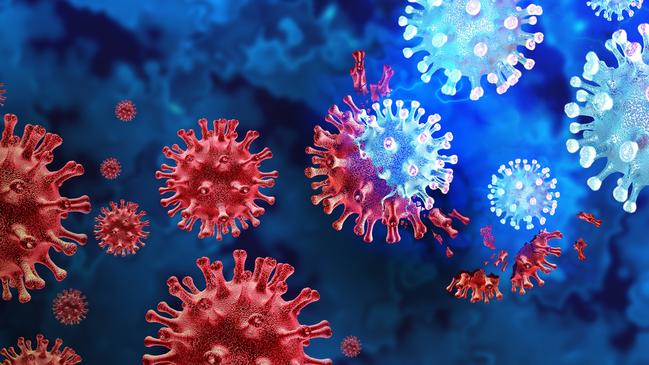How the hunt for antivirals led to surprise heart discovery
Cells grown in a Melbourne lab were infected with Covid. Now a surprise discovery about our heart and lungs could boost treatment.

Victoria
Don't miss out on the headlines from Victoria. Followed categories will be added to My News.
An anti-cancer drug could be repurposed as a Covid treatment, after early but promising Melbourne research involving stem-cell derived heart and lung cells infected with the virus.
Scientists from the Murdoch Children’s Research Institute and the Peter Doherty Institute for Infection and Immunity engineered the cells and tested their response to Covid and various drugs in Petri dishes.
Heart and lung cells were chosen given the impact Covid can have on them, with a German study from the pandemic’s early, pre-vaccine days finding 78 per cent of recovered patients had cardiac complications.
Murdoch Children’s research officer Elizabeth Stout said their study found the virus used different “pathways” to enter heart and lung cells, explaining why some drugs were effective at treating infection in one cell type but not another.
“The way that lung cells allow that virus in versus the way that the heart cells go about it is actually slightly different,” she said.
“Some drugs work by blocking certain things from happening.”
She said if a drug was blocking an inactive pathway that wasn’t being used by the virus, it therefore “becomes ineffective” in treating Covid.
“The hope would be to have an anti-viral that would be able to work on all the organs you’re trying to protect,” she said.
Researchers analysed drugs that have already passed safety tests, meaning they could be available sooner.
Dr Stout said they found two promising candidates.
“Alectinib [an anti-cancer drug] and SPHINX31, those were very good for both heart and lung cells,” she said.
The study, published in Stem Cell Reports, also confirmed existing antivirals, such as Remdesivir and Molnupiravi, treated Covid but found the effectiveness in lung and heart cells was higher in some than others.
While Alectinib and SPHINX31 would need to undergo patient trials before they can be used for Covid treatment, Doherty Institute virologist Kanta Subbaro said their research had provided “valuable insights” to advance much-needed therapeutic options.
“To date, only a handful of drugs have been approved for use in hospitalised COVID-19 patients and more are needed,” Professor Subbaro said.
Dr Stout, who moved interstate to Melbourne in the midst of the 2020 lockdowns for the research, said it was a testament of what can be achieved in a pandemic when groups come together.
Three Universities (Monash, Melbourne and Sydney), the Walter and Eliza Hall Institute of Medical Research and the Royal Children’s Hospital were also involved.




